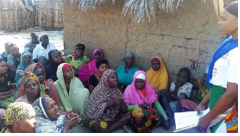Speeches Shim
COMMUNICATION FOR IMPROVED HEALTH OUTCOMES - CIHO ![]() (pdf - 161k)
(pdf - 161k)
OVERVIEW
Indicators for family planning, HIV/AIDS, orphans and vulnerable children (OVC), malaria, and nutrition demonstrate the urgent need for national multi-channel social and behavior change (SBC) campaigns to promote healthy behavior and use of health products and services across Mozambique. Mozambique currently has one of the lowest modern contraceptive prevalence rates, with rates as low as 17.8% percent in some provinces. Regarding HIV/AIDS, Mozambique’s prevalence rose to 13.2% in 2015. Twelve percent of children under 18 are orphans, with a 29% HIV prevalence among orphans aged 15-17. Malaria remains the leading public health problem with a national average of 40.2% prevalence among children under five. Furthermore, 43% of children under 5 years of age suffer from chronic malnutrition – 46% in rural areas and 35% in urban areas. By understanding how and why people act as they do, they can create and implement actions and approaches that will remove barriers to behavior and subsequently improve nationwide health indicators.
PROGRAM DESCRIPTION
CIHO aims to achieve its goal, first, by strengthening the evidence base for effective SBC interventions with target populations in Mozambique. The project designs and produces high quality communication resources for use by a range of partners; designs implementation plans for national campaigns for priority audiences; implements new innovative approaches to improving treatment and retention outcomes among people living with HIV/AIDS; and is adapting existing positive prevention messaging into a pilot campaign to reach men, women and adolescents in order to promote health-seeking behavior. Secondly, the project improves health communication systems to coordinate SBC interventions at the national and sub-national levels. This is achieved through activities such as enhancing leadership and SBC skills of key stakeholders; strengthening health providers’ in-service training in SBC skills; improving demand for voluntary medical male circumcision among men 15-29; and building the capacity of SBC practitioners to generate and utilize research, monitoring and evaluation data to inform effective SBC programs.
EXPECTED RESULTS/IMPACTS
CIHO will strengthen the capacity of the Mozambican government – in particular the Ministry of Health and National Institute of Health – along with its partner NGOs, academic institutions and community-based organizations. Implementation includes, more specifically, strengthening the capacity of individuals and organizations to design, implement, monitor and evaluate strategic SBC interventions at different levels, tailored to their function and mandate. Furthermore, the project will strengthen systems and structures within the government to effectively lead, coordinate, guide and provide oversight for health-related SBC interventions in Mozambique.


Comment
Make a general inquiry or suggest an improvement.